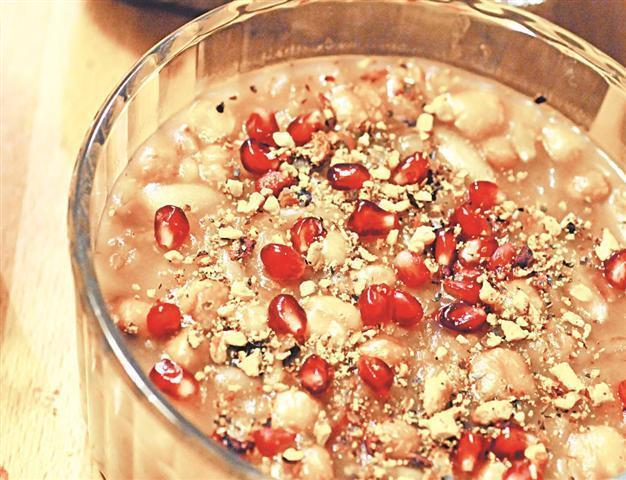Be merry with wheat berry
Aylin Öney TAN

The richness of the dessert is mirrored in Aşure rituals and stories about its origin.
Thanksgiving is not over for Turkey. It started Nov. 24 and will go on for a month. I’m not talking about the “turkey” on the table, of course. Nov. 24 was the day of “Aşure” in Turkey, the time to celebrate by sharing a sweet pudding of the same name.Aşure is a congee-like sweet primarily made of wheat berries with a handful each of beans, chickpeas, raisins, dried apricots and nuts, decorated elaborately with more dried fruits, nuts and pomegranates. Any grain, dried fruit or nut can go into this pudding, the more the merrier, resulting in a rich, nourishing concoction that is surprisingly smooth and satisfying.
Aşure is definitely a wholesome comfort food. However, when flavored with a liberal dose of rose water, it takes on an oriental, mystic vibe, transforming the humble mixture into a sophisticated treat.
The richness of the dessert is mirrored in Aşure rituals and stories of its origin.
Aşure is the 10th day of the Muharrem, the first month of the lunar Islamic calendar. Traditionally, it is important to fast for the first 10 days of Muharrem and prepare the pudding as a feast for the last day of fasting. The term “ashura” actually means “the 10th” in Arabic, hence the name comes from the date the dish is prepared.
The Semitic root for 10, “ashurah,” and fasting on the 10th day of the first month obviously has connections with the fast of Yom Kippur, which occurs on the 10th of Tishri, the first month of the Jewish calendar.
Celebrating and Mourning
Wheat has been a symbol of fertility and prosperity ever since it was cultivated. The Greek goddess Demeter is always depicted with a wheat stalk in hand, as are many other fertility goddesses, like her Hittite predecessor Kubaba and Roman successor Ceres, the mother of agriculture and all grain crops. Wheat has always been related to deities, so it is no surprise that it was adopted by the Islamic tradition in Turkey as well. The wheat berry pudding decorated with pomegranate seeds, another symbol of fertility, makes the ultimate celebration dish.
Aşure is not only about celebrating. The Aşure ritual is particularly important for the Alevi Muslims of Turkey. The 10th of Muharrem marks the tragedy of Kerbela, when the Prophet’s grandsons were killed, making it a day of lament for Alevis, to which Aşure symbolizes mourning rather than celebration, but a mourning that also includes joy and hope in rebirth and the future. Aşure is about sharing and the dessert is always made in huge amounts and distributed to neighbors, friends, relatives, even strangers and definitely to the poor. During the whole month of Muharrem, every house is in the continuous process of making aşure, a ritual in itself.
Translated in English as Noah’s Pudding, aşure is related to a legend that attributes its origin to Noah’s
Ark. The dish is said to have been created with whatever food remained onboard once the ark finally reached shore after the disastrous flood. That is why it is also referred to as “şükran çorbası” in rural Anatolia, meaning Thanksgiving soup.
aylin.tan@hdn.com.tr
Bite of the week
Cork of the weekThere is no booze that can go with aşure, but you can actually get a bit intoxicated if you try a good, slightly tart, boza. Boza, said to be the inspiration for the word booze, is a fermented grain beverage that may well be the origin of beer. British soldiers discovering its fermented qualities in Egypt and it is surely an acquired taste for first-timers. Instead, there is always Gusta, Turkey’s only
wheat beer, if you wish to be merry with a wheat berry!
Fork of the week
The best aşure is the one cooked by your neighbor. That is my motto! Although I take the toil of preparing it every year, it is way better to enjoy one prepared by others. It is difficult to decide on the best aşure in town, but the one at Hacı Abdullah might be considered the classic standard for
this Thanksgiving pudding.
















